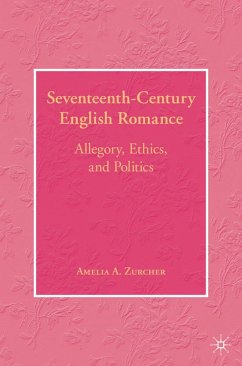Overturning the common characterization of Seventeenth Century English prose romance as an exhausted, imitative genre with little bearing on the evolution of the novel, this book argues that early modern romance was a central forum for exploring the newly pressing moral-philosophical and political problem of self-interest.
"This is a brilliant and theoretically sophisticated account of the centrality of romance to early modern culture. Taking issue with the canonical work of Patterson and McKeon, Zurcher shows how romance diagnoses the perils and ultimate impasse of the newly dominant idiom of self-interest in politics and morality and, in doing so, anticipates certain aspects of modern ethical theory.' - Victoria Kahn, Professor of English,University of California at Berkeley
"This is a very intelligent study, with an approach that is largely chronological, beginning with Sidney's Arcadia and Mary Wroth's Urania, then focusing on Barclay's Argenis, followed by a number of mid-century and Restoration romances, so as to trace the point at which, because of the different context of the Restoration, the genre becomes exhausted. Zurcher has read widely in romance, in French literature, and in recent historical and theoretical writing. Interwoven with the discussion of seventeenth-century ethics is some discussion of twentieth-century authors who have written on self-interest. She ends by briefly suggesting that the study of the seventeenth century romance may make a contribution to twenty-first century ethical thought. This is a welcome contribution to the field." - Lois Potter, Ned B. Allen Professor of English, University of Delaware
"Zurcher's book is a truly impressive accomplishment. Its argument ranges from history, including political history, to literary theory, embracing past and current views of romance and allegory, to a focal engagement with the ethics of (self-)interest.Zurcher treats a wide range of seventeenth-century prose romances in English, connecting them with the work of Spenser, Wyatt, Sidney, Shakespeare, Milton, Puttenham, Hobbes, and Grotius. These connections frame her discussion of once-popular romances in ways that compel interest and ensure serious consideration." - Judith Anderson, Chancellor's Professor of English, Indiana University
"This is a very intelligent study, with an approach that is largely chronological, beginning with Sidney's Arcadia and Mary Wroth's Urania, then focusing on Barclay's Argenis, followed by a number of mid-century and Restoration romances, so as to trace the point at which, because of the different context of the Restoration, the genre becomes exhausted. Zurcher has read widely in romance, in French literature, and in recent historical and theoretical writing. Interwoven with the discussion of seventeenth-century ethics is some discussion of twentieth-century authors who have written on self-interest. She ends by briefly suggesting that the study of the seventeenth century romance may make a contribution to twenty-first century ethical thought. This is a welcome contribution to the field." - Lois Potter, Ned B. Allen Professor of English, University of Delaware
"Zurcher's book is a truly impressive accomplishment. Its argument ranges from history, including political history, to literary theory, embracing past and current views of romance and allegory, to a focal engagement with the ethics of (self-)interest.Zurcher treats a wide range of seventeenth-century prose romances in English, connecting them with the work of Spenser, Wyatt, Sidney, Shakespeare, Milton, Puttenham, Hobbes, and Grotius. These connections frame her discussion of once-popular romances in ways that compel interest and ensure serious consideration." - Judith Anderson, Chancellor's Professor of English, Indiana University








